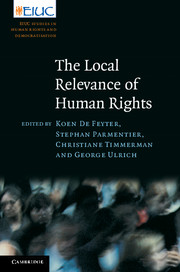Book contents
- Frontmatter
- Contents
- Contributors
- Series editors' preface
- Preface
- Abbreviations
- 1 Introduction: reconsidering human rights from below
- 2 Sites of rights resistance
- 3 Freedom from want revisited from a local perspective: evolution and challenges ahead
- 4 Relevance of human rights in the glocal space of politics: how to enlarge democratic practice beyond state boundaries and build up a peaceful world order
- 5 The local relevance of human rights: a methodological approach
- 6 Ensuring compliance with decisions by international and regional human rights bodies: the case of the European Committee for the Prevention of Torture
- 7 Building rights-based health movements: lessons from the Peruvian experience
- 8 Defining human rights when economic interests are high: the case of the western Shoshone
- 9 Struggling to localise human rights: the experience of indigenous peoples in Chile
- 10 Enforcing environmental rights under Nigeria's 1999 Constitution: the localisation of human rights in the Niger Delta region
- 11 Conflict resolution through cultural rights and cultural wrongs: the Kosovo example
- 12 Epilogue: widening the perspective on the local relevance of human rights
- Index
- References
2 - Sites of rights resistance
Published online by Cambridge University Press: 07 October 2011
- Frontmatter
- Contents
- Contributors
- Series editors' preface
- Preface
- Abbreviations
- 1 Introduction: reconsidering human rights from below
- 2 Sites of rights resistance
- 3 Freedom from want revisited from a local perspective: evolution and challenges ahead
- 4 Relevance of human rights in the glocal space of politics: how to enlarge democratic practice beyond state boundaries and build up a peaceful world order
- 5 The local relevance of human rights: a methodological approach
- 6 Ensuring compliance with decisions by international and regional human rights bodies: the case of the European Committee for the Prevention of Torture
- 7 Building rights-based health movements: lessons from the Peruvian experience
- 8 Defining human rights when economic interests are high: the case of the western Shoshone
- 9 Struggling to localise human rights: the experience of indigenous peoples in Chile
- 10 Enforcing environmental rights under Nigeria's 1999 Constitution: the localisation of human rights in the Niger Delta region
- 11 Conflict resolution through cultural rights and cultural wrongs: the Kosovo example
- 12 Epilogue: widening the perspective on the local relevance of human rights
- Index
- References
Summary
Introduction
After the adoption of the Universal Declaration of Human Rights, the international community increasingly began to use the language of human rights to address issues of human dignity. A vast body of international and constitutional human rights law was enacted: the acquis of international human rights law, according to the UN High Commissioner for Human Rights, currently consists of no fewer than eight core conventions and numerous protocols. A plethora of intergovernmental, national and civil society institutions have committed to human rights as a policy objective and engage in human rights activities.
At the start of the new millennium, world heads of state and government resolved ‘to spare no effort’ to respect all internationally recognised human rights, and ‘to strive for the full protection and promotion in all our countries of civil, political, economic, social and cultural rights for all’. The statement was made as part of a Declaration aimed at ensuring that ‘globalisation becomes a positive force for all the world's people’. Arguably, issues of human dignity could well have been addressed globally in a different language than that of the language of human rights, and there may be some disadvantages to the choice made – a tendency, perhaps, to overemphasise self-interest and private gain and to underestimate the importance to human dignity of an individual's relationships with others – but clearly significant progress has been made in mobilising the international community on the issue of human dignity through the instrument of human rights.
- Type
- Chapter
- Information
- The Local Relevance of Human Rights , pp. 11 - 39Publisher: Cambridge University PressPrint publication year: 2011
References
- 5
- Cited by

